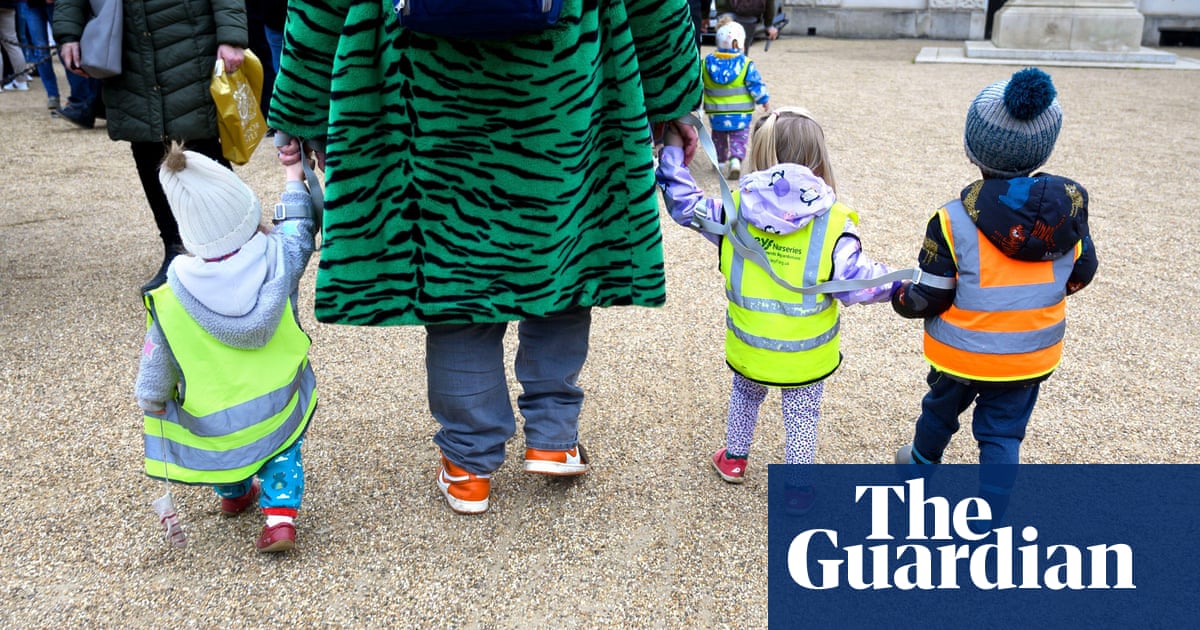Tens of tons of of children in migrant and evacuee relations within the UK are being refuted accessibility to government-funded youngster care as a consequence of benefit limitations linked to their mothers and dads’ migration standing, a file states.
Having “no recourse to public funds” (NRPF) suggests mothers and dads are usually not certified to 30 hours of cost-free youngster care and are needing to remain at residence to care for his or her little ones fairly than functioning. This is urgent relations proper into destitution and rejecting their children some great benefits of the very early years schooling and studying available to their friends, the file discovers.
About 4 million people within the UK are influenced by NRPF limitations, in accordance with the file by the Institute for Public Policy Research (IPPR) together with the civils rights organisation Praxis, which offers with vacationers and evacuees.
They include relating to 71,000 relations that would definitely or else get authorised for 30 hours of cost-free youngster care per week– supplied they fulfilled the earnings restrict– had been it besides NRPF limitations, which outlaw accessibility to the social safety system.
The file means that the system of kid care privileges omits relations encountering finest disadvantage, whatever the federal authorities’s coverage dedication to break down obstacles to risk for every child.
Families influenced by NRPF are certified to a lower in half deal of 15 financed hours of take care of their 3- and four-year-olds, and a few low-income relations may be certified to take care of their two-year-olds, nonetheless they can’t entry any type of numerous different help with youngster care bills, consisting of the extended privilege for functioning mothers and dads, and international credit score scores help with youngster care bills and tax-free youngster care.
Shams Sarker pertained to London 3 years earlier from Bangladesh beneath an skilled migrant job visa, nonetheless his two-year-old little woman– that was birthed within the UK– isn’t certified to the very same government-funded youngster care as numerous different children.
As an end result, he and his different half take it consequently to stay at residence to take care of her, lowering functioning hours and earnings. His little woman, on the similar time, loses on the likelihood to mix and uncover with numerous different children in a really early years establishing.
“We don’t get access to certain things and have to pay extra for healthcare, fine,” claimedSarker “But at least let children have equal rights. I expected the rules to be the same for all children. My baby is growing up and she’s not getting the same benefit that any other baby born here will have.”
IPPR and Praxis checked 159 mothers and dads that contended the very least one child listed under school-age youngster and had been influenced by NRPF limitations. They situated 55% utilized some sort of kid care, in comparison with 72% of the essential populace. More than a third (36%) of people who utilized youngster care counted on casual youngster care from family members and good pals, and 41% of people who didn’t make the most of youngster care claimed the absence of a very free privilege had really stop them or their companion from acquiring a job.
Dr Lucy Mort, an aged research different at IPPR, claimed: “Restricting access to childcare forces parents out of work, pushes families deeper into poverty, and holds children back from vital early education. Lifting these unfair barriers would not only support working parents but also give every child the best start in life.”
Josephine Whitaker-Yilmaz, a plan and public occasions supervisor at Praxis and co-author of the file, included: “If this government is serious about ensuring that more children are ready for school, lifting these restrictions on support with childcare costs is a commonsense solution that will benefit some of the most disadvantaged children in our communities.”
A distinct file by the IPPR situated almost fifty p.c of children in relations with non-UK birthed mothers and dads resided in destitution, in comparison with 25% of assorted different children. It anticipated that the child destitution approach, anticipated to be launched in springtime, would definitely fall brief until it attended to increasing problem amongst children with mothers and dads birthed outdoors the UK.
Hafsa, a mommy of two that will get on an skilled worker visa, knowledgeable scientists: “I can’t even buy clothes for my children. I can’t buy them shoes; I can’t buy them a single toy. In the last 10 days of the month, I struggle to buy food for the children.”
A Department for Education consultant claimed: “Giving each youngster the most effective begin in life is central to our mission to interrupt the unfair hyperlink between background and success and, by our Plan for Change, we’ll get tens of hundreds extra youngsters – a file proportion – school-ready by age 5.
“That’s why, regardless of having to take powerful selections to repair the foundations of the economic system, we’ve prioritised investing £15m to kickstart our rollout of hundreds of locations in school-based nurseries to fulfill native want.
“Parents with no recourse to public funds can access 15 hours of funded childcare per week from when their child turns two, subject to wider eligibility, and we will continue to work to make sure government-funded hours are fair and accessible to parents.”



